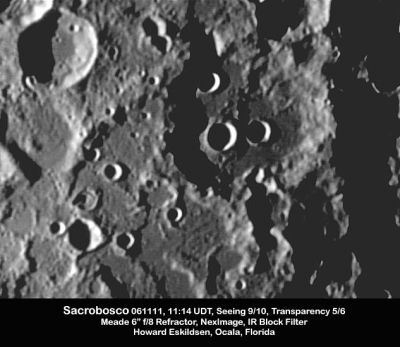Sacrobosco
Contents
[hide]Sacrobosco
|
Lat: 23.7°S, Long: 16.7°E, Diam: 98 km, Depth: 3.8 km, Rükl: 56, pre-Nectarian |
Images
LPOD Photo Gallery Lunar Orbiter Images Apollo Images
- Sacrobosco was also captured on several frames made by the southward looking mapping/metric Fairchild camera of Apollo 16, such as frame AS16-M-0699, which shows Sacrobosco near the central part of the depicted curved horizon.
- Research: Danny Caes.
Maps
(LAC zone 96A3) LAC map Geologic map
Description
Sacrobosco in the lunar sunset. Wings seem to droop from the 3 and 10 o'clock positions. Could this be remnants of a more ancient crater? - Howard Eskildsen
Description: Elger
(IAU Directions) SACROBOSCO.--This is one of those extremely abnormal formations which are almost peculiar to certain regions in the fourth quadrant. It is about 50 miles in greatest diameter, and is enclosed by a rampart of unequal height, rising on the W. to 12,000 feet above the floor, but sinking in places to a very moderate altitude. On the N. its contour is, if possible, rendered still more irregular by the intrusion of a smaller ring-plain. On the N.W. side of the floor stands a very bright little crater and two others on the S. of the centre, each with central mountains.
Description: Wikipedia
Additional Information
Depth data from Kurt Fisher database
- Westfall, 2000: 3.8 km
- Viscardy, 1985: 3.5 km
- Cherrington, 1969: 2.8 km
- Satellite crater Sacrobosco C is on the ALPO list of banded craters
Nomenclature
Johannes de Sacrobosco or Sacro Bosco (John of Holywood, c. 1195 - c. 1256) was an English scholar and astronomer/astrologer who taught at the University of Paris and wrote the authoritative mediaeval astronomy text Tractatus de Sphaera.
LPOD Articles
Bibliography
